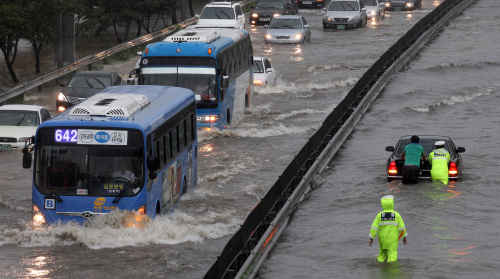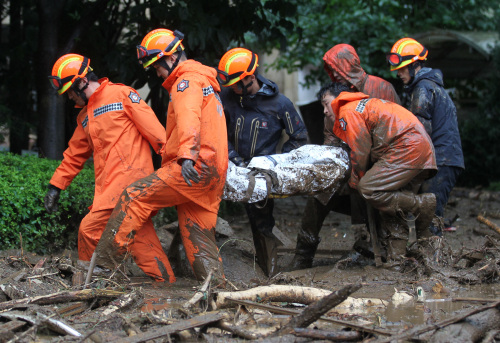At least 41 people were killed and 12 others missing as of Thursday morning as torrential rains triggered landslides, flooding and power outages in Seoul and central regions, the nation’s disaster control agency said.
“The death toll could rise, as more reports are coming in,” an official at the National Emergency Management Agency said.
“The death toll could rise, as more reports are coming in,” an official at the National Emergency Management Agency said.


In Chuncheon, some 85 kilometers east of Seoul, 13 people died after a landslide destroyed a mountain pension and three residential buildings just after midnight Wednesday. Twenty others were injured, with four of them in critical conditions.
The victims were mostly students from Inha University in Incheon, who were in the area for volunteer work during their summer vacation, emergency officials said.
“I was sleeping on the second floor of the pension when I heard the thunderous sound of a landslide. The stairs collapsed and I was buried in mud,” one student rescued by firefighters told the Yonhap news agency.
In Seoul, which recorded more than 400 millimeters of precipitation from Tuesday till early Wednesday, tons of mud from Mount Woomyeon swept through nearby villages in the city’s southern ward of Seocho, killing 16.
Of them, six were killed in a village of Jeonwon.
The landslide also hit another village, Hyeongchon, killing the wife of Shinsegae chairman Koo Hak-su. Yang Myeong-ja was killed while trying to check the flooded basement of her home, according to local reports.
A plant collapsed in Paju, Gyeonggi Province, in the evening leaving three workers dead and two others injured.
Police, firefighters and emergency officials were carrying out rescue efforts, as half of the village, or about 60 houses, were still isolated.
Another six people were killed and hundreds evacuated as Gonjiam Stream in Gwangju, Gyeonggi Province, flooded.
On top of the casualties from landslides, at least three people were reported missing in flooded streams and rivers, emergency officials said.
Police declared a state of special emergency as roads, streets, subway stations and residential districts were flooded throughout the capital.
More than a thousand officers were mobilized to help ease traffic gridlock and block roadways deemed too dangerous.
Some 36 major roads were closed to traffic nationwide, including 23 in Seoul, and more than 700 homes were flooded in the capital, the disaster control agency said. Mobile phone networks were cut off in some areas.
The Korea Meteorological Administration said downpours tallying more than 110 millimeters of rain per hour, were recorded in Seoul and elsewhere. More rain, as much as 250 millimeters, is expected until early Thursday morning.
Districts in Gangnam, south of Han River in Seoul, were one of the hardest-hit areas.
“All roads near my home are flooded and it seems no bus operates here. I had to call my boss that I can’t come to work today,” a citizen living in Yangjae-dong wrote via Twitter.
Electricity outage hit nearly 10,000 homes in the Gangnam area, while hundreds of traffic lights malfunctioned, worsening the traffic chaos.
The Sadang intersection, the southern gate to the capital, was flooded, causing severe traffic jam in the area. Its nearly subway station, Sadang, was shut down in order to prevent it from being submerged.
Subway services were disrupted.
The services on subway line No. 1 was halted for about an hour in early Wednesday morning after Oryudong Station was submerged.
Another line linking Seoul and Bundang, a residential town in the city of Seongnam, was also disrupted due to submerged railroads.
TV and radio station EBS stopped broadcasting its regular programs after its facilities were damaged by the flood.
By Lee Sun-young (milaya@heraldcorp.com)">milaya@heraldcorp.com)
The victims were mostly students from Inha University in Incheon, who were in the area for volunteer work during their summer vacation, emergency officials said.
“I was sleeping on the second floor of the pension when I heard the thunderous sound of a landslide. The stairs collapsed and I was buried in mud,” one student rescued by firefighters told the Yonhap news agency.
In Seoul, which recorded more than 400 millimeters of precipitation from Tuesday till early Wednesday, tons of mud from Mount Woomyeon swept through nearby villages in the city’s southern ward of Seocho, killing 16.
Of them, six were killed in a village of Jeonwon.
The landslide also hit another village, Hyeongchon, killing the wife of Shinsegae chairman Koo Hak-su. Yang Myeong-ja was killed while trying to check the flooded basement of her home, according to local reports.
A plant collapsed in Paju, Gyeonggi Province, in the evening leaving three workers dead and two others injured.
Police, firefighters and emergency officials were carrying out rescue efforts, as half of the village, or about 60 houses, were still isolated.
Another six people were killed and hundreds evacuated as Gonjiam Stream in Gwangju, Gyeonggi Province, flooded.
On top of the casualties from landslides, at least three people were reported missing in flooded streams and rivers, emergency officials said.
Police declared a state of special emergency as roads, streets, subway stations and residential districts were flooded throughout the capital.
More than a thousand officers were mobilized to help ease traffic gridlock and block roadways deemed too dangerous.
Some 36 major roads were closed to traffic nationwide, including 23 in Seoul, and more than 700 homes were flooded in the capital, the disaster control agency said. Mobile phone networks were cut off in some areas.
The Korea Meteorological Administration said downpours tallying more than 110 millimeters of rain per hour, were recorded in Seoul and elsewhere. More rain, as much as 250 millimeters, is expected until early Thursday morning.
Districts in Gangnam, south of Han River in Seoul, were one of the hardest-hit areas.
“All roads near my home are flooded and it seems no bus operates here. I had to call my boss that I can’t come to work today,” a citizen living in Yangjae-dong wrote via Twitter.
Electricity outage hit nearly 10,000 homes in the Gangnam area, while hundreds of traffic lights malfunctioned, worsening the traffic chaos.
The Sadang intersection, the southern gate to the capital, was flooded, causing severe traffic jam in the area. Its nearly subway station, Sadang, was shut down in order to prevent it from being submerged.
Subway services were disrupted.
The services on subway line No. 1 was halted for about an hour in early Wednesday morning after Oryudong Station was submerged.
Another line linking Seoul and Bundang, a residential town in the city of Seongnam, was also disrupted due to submerged railroads.
TV and radio station EBS stopped broadcasting its regular programs after its facilities were damaged by the flood.
By Lee Sun-young (milaya@heraldcorp.com)">milaya@heraldcorp.com)


















![[Today’s K-pop] Treasure to publish magazine for debut anniversary](http://res.heraldm.com/phpwas/restmb_idxmake.php?idx=642&simg=/content/image/2024/07/26/20240726050551_0.jpg&u=)